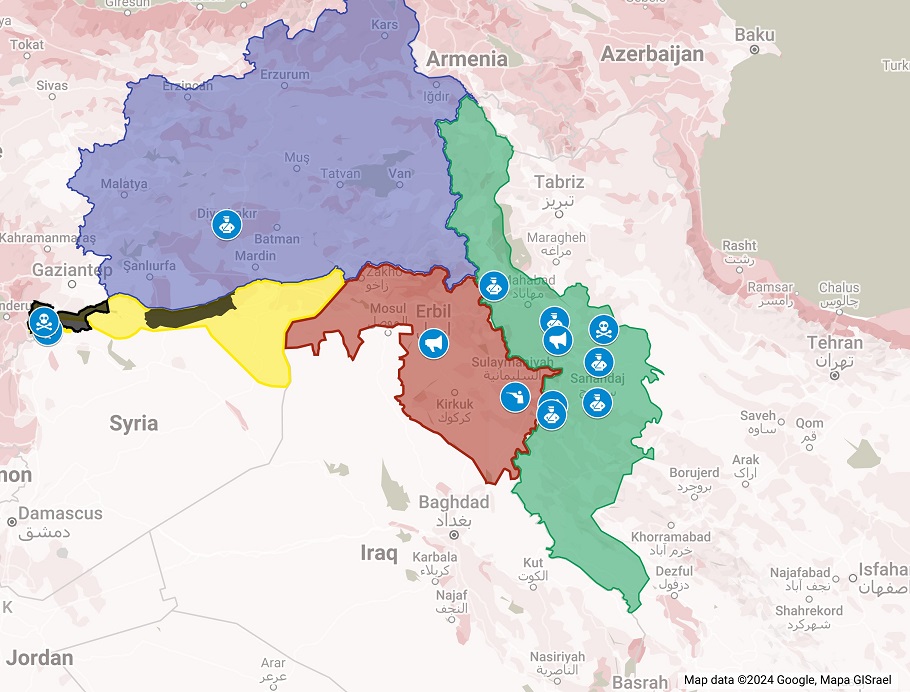1.2K
A weekly brief of events occurred in the Kurdistan regions of Iran, Iraq, Syria, and Turkey.
Iran
- The Office of the United Nations High Commissioner for Human Rights (OHCHR) Independent International Fact Mission on the Islamic Republic of Iran (FFMI) presented its findings on the Iranian regime’s wanton human rights abuses in Geneva on March 18. FFMI Chair Sara Hossain emphasized that the regime was responsible for the death of the Kurdish woman Zhina Amini. “Our finding showed, based on examination of medical documents, and also a pattern evidence of treatment of women in these situations, that Zhina Mahsa Amini’s death was an unlawful death, and we believe the state is responsible,” said Hossain. Hossain also discussed the regime’s use of “unnecessary, disproportionate force” against peaceful protesters that resulted in at least 551 “unlawful” killings.
- Iranian and Iraqi border guards continued targeting Kurdish border porters (kolbars) along the Iran-Iraq border and have now wounded at least two dozen during the past two weeks, one of whom died nine days after being wounded. The Iraqi government is complementing its increasing crackdown on cross-border activity by erecting hundreds of miles of fence along the border of Iranian and Iraqi Kurdistan. The Iraqi government’s hardline approach to its northern border with Iran stems from a recent security agreement it reached with the Iranian regime. That said, the Iraqi government’s decision to fence the border has faced protests from local residents in Halabja and other border towns who claim the planned fences will run through their properties. Separately, the Hengaw Organization for Human Rights reported the Iranian regime’s security forces arrested several Kurds, including two teenagers in Diwandara, an environmental activist in Senna, an activist in Saqqez, and a man in Shinno. Hengaw also claimed regime forces tortured a protester from Takab to death in a Saqqez prison. Lastly, regime courts sentenced six activists in Shinno and Bokan for participation in anti-government protests.
Iraq
- The Komala Party of Iranian Kurdistan announced the Iranian regime assassinated a party member near its headquarters in Sulaymaniyah Governorate’s Zerguez village on Saturday. “Shuaib Zarei, a brave Peshmerga and a loyal member of Komala, was assassinated by the dark hands of the mercenaries of the Islamic Republic,” read Komala’s statement. Komala also said its members are expecting security forces in Iraqi Kurdistan to protect them from Iranian attacks. Rudaw reported security forces arrested the perpetrator of Saturday’s assassination in Penjwen. The Iranian regime has a long history of assassinating anti-regime dissidents in Iraqi Kurdistan, Europe, and even the United States since it seized power in 1979.
- The Iraqi government, despite several agreements and the passage of the nation’s budget law, remains unwilling to fully release funding for the salaries of public employees in Iraqi Kurdistan. The Kurdistan Regional Government (KRG) claimed that the Iraqi government released 568 billion Iraqi dinars for February’s salaries, which was 300 billion dinars short of what was actually needed. The KRG backed up its claim by releasing a report highlighting the fact the recently passed budget law mandates Baghdad pay Iraqi Kurdistan over nine trillion dinars for 2023. The KRG’s budgetary issues are further exacerbated by a recent Iraqi Federal Supreme Court ruling that transferred the authority to disburse employee salaries from the KRG to the Iraqi government and ordered Iraq’s Ministry of Finance to oversee the opening of bank accounts for the employees. Simultaneously, the Kurdistan Democratic Party (KDP) announced it was boycotting Iraqi Kurdistan’s upcoming parliamentary elections. “It is in the best interest of our people and our nation that our party does not endorse decisions or systems imposed externally upon the will of the Kurdistan Regional Government and its constitutional institutions,” read a statement from the KDP Political Bureau. The KDP blamed several successive Federal Supreme Court rulings for its decision, including one that abolished the 11 quota seats for Christians and Turkmen in the Kurdistan Parliament. U.S. Ambassador to Iraq Alina Romanowski expressed concern regarding the KDP’s planned boycott, while the United Nations Assistance Mission for Iraq (UNAMI) emphasized elections were essential and called for all parties to “work in the interests of the people towards solutions.”
Syria
- A settler in Turkish-occupied Afrin killed a young Kurdish boy named Ahmed Khaled Ma’amo on Thursday, March 14, sparking outrage among the Kurdish community already facing demographic changes and ethnic cleansing at the hands of Turkey and its proxies. The Autonomous Administration for North and East of Syria (AANES) condemned the murder, denouncing Turkey’s six-year invasion into Afrin as a “stain of shame” for humanity. They accused the Turkish government of issuing instructions to its Syrian mercenaries to conduct “demographic change, murder, kidnapping, and violations of women’s rights.” This incident coincides with renewed internal conflicts between Turkish-backed factions in Afrin, with the Syrian Observatory for Human Rights (SOHR) reporting 8,700 kidnappings and arbitrary arrests since the invasion began. The SOHR also highlighted the displacement of 310,000 civilians, equivalent to 56% of the indigenous residents, due to the Turkish invasion. In a separate incident, a Turkish airstrike in Aleppo’s countryside (Shahbaa) killed a civilian and wounded another.
Turkey
- On Sunday, millions of Kurds across the Kurdish region and other major cities celebrated Newroz. However, in Istanbul, nearly 100 people, including journalists, were arrested by the police. Simultaneously, dozens of organizers in several cities faced arrests, allegedly for “propaganda for a terrorist organization.” During Newroz celebrations, speeches by candidates and officials of the pro-Kurdish Peoples’ Equality and Democracy Party (DEM) addressed the Kurdish question in Turkey and advocated for the freedom of imprisoned Kurdish leader, Abdullah Ocalan. Ahead of the celebrations, authorities had already arrested several DEM party members in Istanbul and Diyarbakir (Amed). These developments occurred just twelve days before the local elections in Turkey, during which the DEM party expanded its campaign in major Turkish cities, raising concerns within the ruling Justice and Development Party (AKP).

